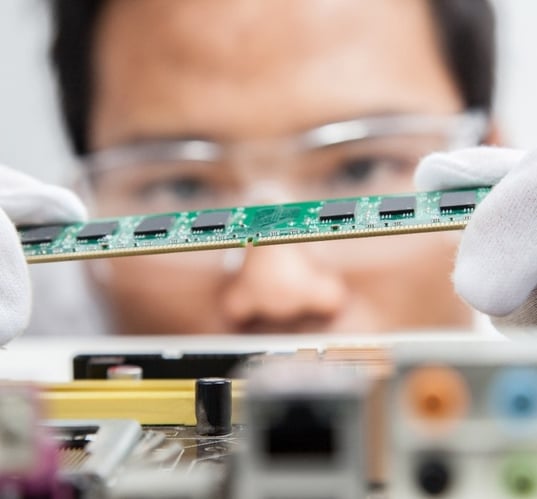What you need to know to improve product cost, quality and time to-market
As you bring a product to market, the electronics manufacturing partners you rely on should help you achieve your ultimate goal — product optimization. “Design for Excellence” (or “DfX”) is a phrase they may have used to describe their services. But what does it mean for Printed Circuit Board Assembly (PCBA), and the product design and manufacturing process? On this page, we take a look at how it affects your ability to get a top-quality product to your customers when they need it.
Table of Contents
- What is Design for Excellence?
- What does Design for Excellence entail?
- Design for Manufacturing
- Design for Cost/Procurement
- Design for Testability
- Design for Assembly
- What are the benefits of a Design for Excellence service?
- What does Design for Excellence mean for PCBA?
- Does DfX change how my usual PCBA design service works
- How to reap the greatest rewards from Design for Excellence
What is Design for Excellence?
Design for Excellence (DfX) is a product engineering methodology. It’s a systematic approach to optimizing the product development process to achieve your target objectives. For PCBAs, this means guaranteeing the manufacture of a quality product at a cost-effective price, delivered to the deadline.
DfX helps manufacturers define the quality of a product before production begins. It’s an integral part of any New Product Introduction (NPI) process — think of it as a safety check when bringing an electronic product to mass production, and then to market.
What does Design for Excellence entail?
DfX consists of a series of methods, guidelines, standards, and checks at various stages of a product’s life cycle. It’s a series of constituent processes that analyses the way your product is designed. These include: Design for Manufacturing (DfM), Design for Cost/Procurement (DfC/DfP), Design for Assembly (DfA) and Design for Testability (DfT). Let’s take a closer look at what these entail:
- Design for Manufacturing
This is where you and your EMS partner will ensure the manufacturability of components, and that the complete assembly process lies within the EMS company’s capability. Design for Manufacturing can involve the following steps:
-
-
- Analyzing the circuitry, design, and layout of your printed circuit board
- Making sure the footprint is in line with the reference designators found in your Bill of Materials (BOM)
- Close analysis of materials, tooling, environment, testing, and tolerances
-
Every project managed with a DfX ethos should go through a Design for Manufacturing (DfM) stage. The aim here is to create a high-quality product at an optimized manufacturing cost and to reduce the risk of failure or inefficiencies at the assembly stage. Further benefits include an improved PCB yield, better performance and cost, and improved production stability and predictability.
- Design for Cost/Procurement
DfC/DfP consists of several cost-controlling techniques applied across the manufacturing life cycle. A DfC/DfP review aims to identify and qualify alternative component parts which perform the same function as ones already identified. When doing so, it considers both engineering and process managing requirements.
Having known, pre-qualified alternatives:
-
-
- Optimizes lead times on individual components
- Minimizes production delays in case of shortages of particular parts
-
At the End of Life (EOL) of a product, Design for Procurement also safeguards against including an obsolete component in your manufacturing plan.
- Design for Testability
Your product will need to be tested while in mass production. The Design for Testability (DfT) process analyses the test coverage of your PCB layout and develops the right tools to efficiently test the boards while in production.
DfT is critical to the manufacturing process and ensures your products meet predetermined quality standards. Your EMS partner will design and apply checks and balances to ensure your product functions properly.
An effective DfT process:
-
-
-
- Improves coverage, reliability and final yield
- Reduces field failures
- Improves time to market
-
-
- Design for Assembly
-
Design for Assembly (DfA) shares common objectives with the Design for Manufacturing process but focuses on optimizing your product’s ease of assembly. DfA ensures a smooth assembly of your PCB and that its physical layout rules are met before the prototype is built. Mechanical items such as plastic casings and enclosures, sheet metals, or CNC machining parts are optimized during the DfA phase of production.
Despite increasing rates of automation, your product (or parts thereof) can still be assembled by people. Investing in DfA:
-
-
- Optimises assemblage time
- Reduces error-rate
- Improves assembly yield
- Reduces labor content
-
-
What are the benefits of a Design for Excellence service?
A number of challenges have to be carefully addressed before manufacturing can begin. Partnering with a DfX-oriented Electronic Manufacturing Services (EMS) company means your product will be optimized through critical review at each stage of its lifecycle. This minimizes the risk of product failure and means you can expect your product is created efficiently. DfX is your guarantee against unusable products, inflated costs, and missed deadlines. In short, you get a better product that costs less.
Key benefits of a DfX service include:
- Reduced time to market
- Ensures efficiency
- Lower risk of failure during production and assembly
What does Design for Excellence mean for PCBA?
DfX is an integral part of any PCBA design and manufacture. Design excellence lies at the heart of any electronic contract manufacturing company, and the DfX method lies at the heart of optimized design.
By employing DfX across the whole design and production process, your PCBA design service can identify any challenges you’re likely to face in the mass production phase upfront. How these challenges are addressed depends on what they are, but overall you’ll strengthen the product design, reduce time to market, and increase the product’s competitiveness.
Ultimately, DfX will positively impact the value of your product: finding the most efficient balance between optimal performance and minimized cost. A PCBA design service that’s experienced in DfX can help you determine what function, need, or feature is critical to your product design, and balance these performance needs with the necessary costs of material, labor, testing, and logistics to deliver it.
At Asteelflash, for instance, we partner with you to generate unique solutions that improve and optimize the design and manufacture through our network of in-house design centers. Read more on how our international team of EMS experts applies DfX to our PCBA design services.
Does DfX change how my usual PCBA design service works?
Working with an EMS company or PCBA design service that’s built DfX into their method of production helps avoid common product development mistakes. These can include:
-
-
- Lack of collaboration between departments, or different phases of the manufacturing process
- A poor understanding of supplier capabilities or limitations
- Not meeting customer expectations in terms of product reliability, lifetime or it’s context of use
-
- The DfX method of regular reviews throughout the design process provides critical feedback that can avoid these pitfalls. It does, however, mean that your manufacturing partner gets involved earlier in your product development process, providing feedback on your designs further upstream than you may expect. In return, you gain the assurance that your design is more cost-effective, has higher reliability, and increased manufacturability.Working with an EMS company or PCBA design service fluent in DfX means you’ll partner with a company that provides a full solution. This ensures optimized production from start to finish.Read more on how Asteelflash’s design service complements their engineering expertise to make your project a success from design to mass production.
 How to reap the greatest rewards from Design for Excellence?
How to reap the greatest rewards from Design for Excellence?
-
Ensure you’re getting the best of DfX when bringing your product to market:
Lack of collaboration between departments, or different phases of the manufacturing process, a poor understanding of supplier capabilities or limitations not meeting customer expectations in terms of product reliability, lifetime or it’s context of use
- Revisit this page. We’ll be updating and expanding this page with the latest on Design for Excellence resources, so check-in for a refresher and to keep an eye on the latest DfX content.
- Explore the Asteelflash blog. Keep your finger on the pulse of the latest EMS industry news, including everything from developments in DfX and the PCBA production process, to analyses how the COVID-19 pandemic is affecting the electronics industry supply chain. Visit the Asteelflash blog here.
- Partner with an EMS company and PCBA service provider that specializes in DfX. Enlist the help of more than just a manufacturer. Optimize and improve product cost, quality, and time-to-market with a team that’s built Design for Excellence into their service process.
- Revisit this page. We’ll be updating and expanding this page with the latest on Design for Excellence resources, so check-in for a refresher and to keep an eye on the latest DfX content.



